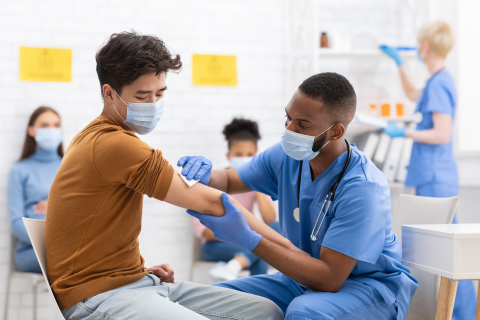BURLINGTON, N.C.--(BUSINESS WIRE)--Nearly 87% of naturally infected COVID-19 patients maintained antibodies to SARS-CoV-2 proteins for at least 10 months, according to a new Labcorp (NYSE: LH) analysis of specimens from 39,086 individuals.
The study, published May 24 in The Lancet-affiliated EClinicalMedicine, offers real-world evidence of the body’s response to the virus and the possibility of protection against future infection. It is the largest known COVID-19-related study by specimen volume of its kind, harnessing Labcorp’s robust testing infrastructure to enhance the public’s understanding of this potentially deadly virus.
“Our observational analysis provides an encouraging timeline for antibody development and sustainability among the U.S. population,” said David Alfego, PhD, Labcorp senior data scientist and the paper’s lead author. “We sincerely hope it sparks more research, helps unearth answers to complex questions and informs critical, post-pandemic planning.”
Alfego and a team of Labcorp scientists analyzed results from tests used to detect antibodies that guard against “spike” and nucleocapsid proteins on the SARS-CoV-2 virus. Their analysis included specimens collected from 39,086 individuals with COVID-19 and tested between March 2020 and January 2021.
By employing various techniques, Labcorp scientists were able to map rates of antibody positivity, as well as the correlation of a person’s age and sex on antibody status.
Notable findings include:
- While sample sizes varied each day after a positive COVID-19 test, the antibody positivity rate to the SARS-CoV-2 spike protein remained mostly stable for the U.S. population through 300 days after the initial test.
- The positivity rate of antibodies to the nucleocapsid protein—a coronavirus component that is more active during early infection—declined more rapidly than the rate of spike antibodies but remained above 60% through 10 months of testing.
- Individuals under the age of 65 showed a more sustained rate of positive antibody results, meaning those 65 and older may have increased difficulty maintaining antibodies for a prolonged period of time.
- There was no statistically significant difference in spike antibody positivity rates between males and females over time.
“This is good news for naturally infected individuals, and potentially for those who have been vaccinated,” said Brian Caveney, M.D., chief medical officer and president of Labcorp Diagnostics. “More research must be done to understand what type and level of antibodies suggest protection from reinfection. But the prolonged presence of certain antibodies is a promising sign as we continue thinking about safely emerging from the pandemic, as well as future vaccinations and the timing of booster shots.”
The research, another example of Labcorp’s significant involvement in the country’s COVID-19 response, can be accessed here.
About Labcorp
Labcorp is a leading global life sciences company that provides vital information to help doctors, hospitals, pharmaceutical companies, researchers, and patients make clear and confident decisions. Through our unparalleled diagnostics and drug development capabilities, we provide insights and accelerate innovations to improve health and save lives. With over 70,000 employees, we serve clients in more than 100 countries. Labcorp (NYSE: LH) reported revenue of $14 billion in FY2020. Learn more about us at www.Labcorp.com or follow us on LinkedIn and Twitter @Labcorp.
Cautionary Statement Regarding Forward-Looking Statements
This press release contains forward-looking statements, including but not limited to statements with respect to our responses to and the expected future impacts of the COVID-19 pandemic, scientific collaborations, customer contracts and relationships, the anticipated benefits of such collaboration and relationships, and the expected impact that the various collaborations and customer relationships may have on the Company’s financial results. Each of the forward-looking statements is subject to change based on various important factors, many of which are beyond the Company’s control, including without limitation, whether our responses to the COVID-19 pandemic will prove effective, the impact of the COVID-19 pandemic on our business and financial condition as well as on general economic, business, and market conditions, the Company’s ability to establish and maintain strategic partnerships and other scientific collaborations, competitive actions in the marketplace, changes in government regulations, including healthcare reform, customer purchasing decisions, including changes in payer regulations or policies, adverse actions of governmental and other third-party payers, patient safety issues, changes in testing guidelines or recommendations, and federal, state, and local governmental responses to the COVID-19 pandemic. These factors, in some cases, have affected and in the future (together with other factors) could affect the Company’s ability to implement the company’s business strategy and actual results could differ materially from those suggested by these forward-looking statements. As a result, readers are cautioned not to place undue reliance on any of our forward-looking statements. The Company has no obligation to provide any updates to these forward-looking statements even if its expectations change. All forward-looking statements are expressly qualified in their entirety by this cautionary statement. Further information on potential factors, risks and uncertainties that could affect operating and financial results is included in the Company’s most recent Annual Report on Form 10-K and subsequent Forms 10-Q, including in each case under the heading RISK FACTORS, and in the Company’s other filings with the SEC.




